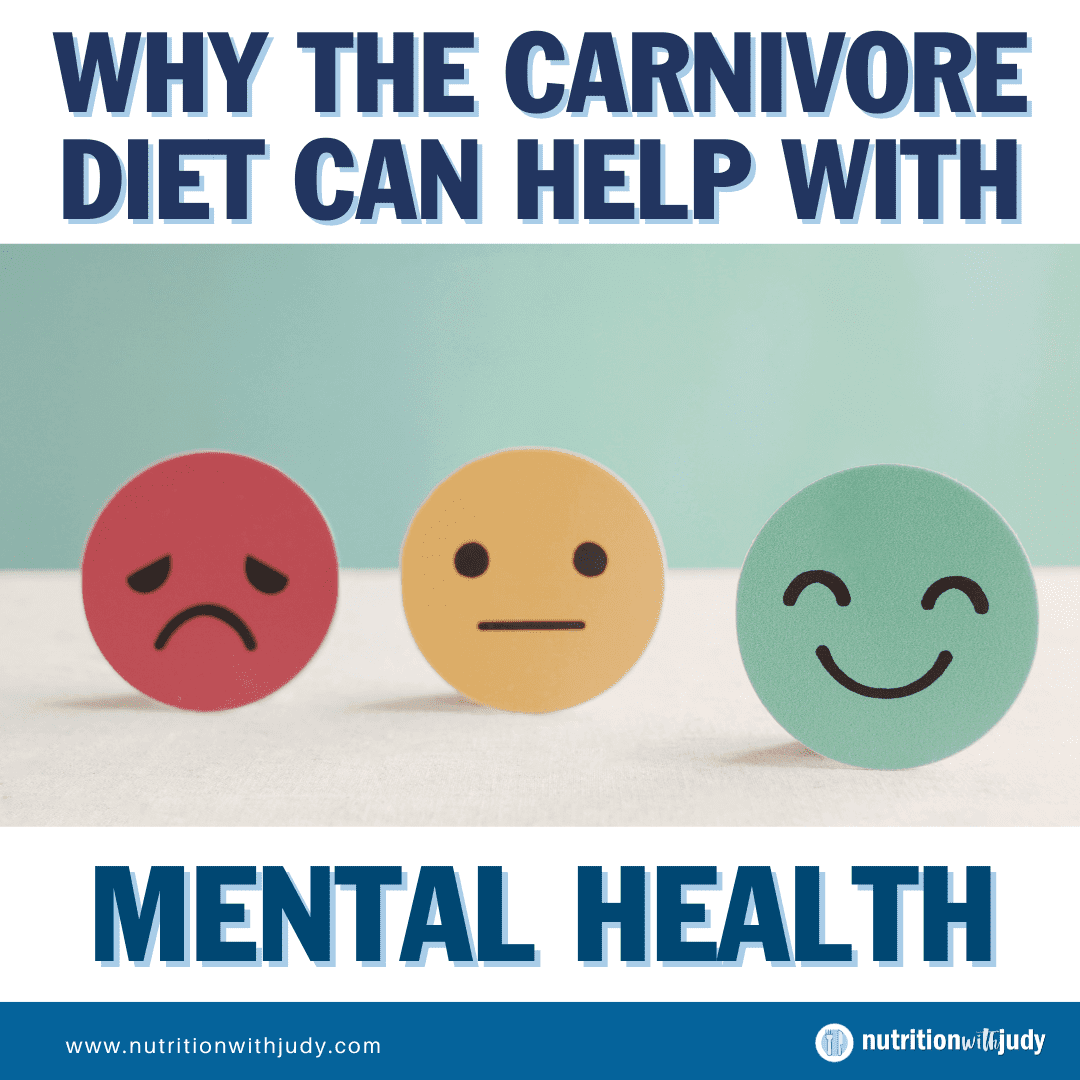

The Carnivore Diet and Mental Health


Mental health has always been a prevalent issue globally. However, rates of anxiety, depression, and substance use disorders have dramatically increased since the beginning of the pandemic. In 2021, a study reported that nearly half of Americans surveyed reported recent symptoms of an anxiety or depressive disorder. Currently, an estimated 26% of Americans who are 18 and older suffer from a diagnosable mental disorder. SSRI prescribing increased by 35.2% from 2015/2016 to 2021/2022 while drugs classified as “other antidepressant drugs” saw the largest increase in usage at 63.3% in the same time period. With these alarming statistics, it’s important to get to the root cause of these mental health conditions and provide the comprehensive support needed. Rather than relying on prescription medications with significant adverse side effects that only band-aid symptoms, there are powerful lifestyle adaptations we can be proactive with for supporting our psychological well-being. The carnivore diet is one of the most powerful tools for supporting mental health. Let’s explore the science behind this effective modality and how the carnivore diet can help support mental health.
What Is the Carnivore Diet?
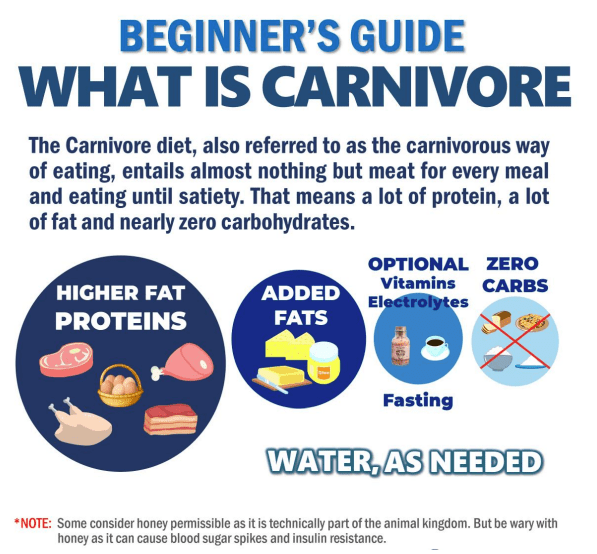

The carnivore diet, also commonly referred to as carnivore or meat-based diet, consists of eating only animal foods and avoiding all plants and grains. Unlike ketogenic and other low-carb diets, the carnivore diet is a true zero-carb or nearly zero-carb way of eating that focuses primarily on animal proteins and fats. There are several variations of the carnivore diet which are defined by differing restrictions and inclusions of particular foods. Choosing the right variation for you should be based on what approach is ideal for personal goals and making this way of eating sustainable long-term. Learn more in-depth about the carnivore diet here.
The Carnivore Diet and Mental Health
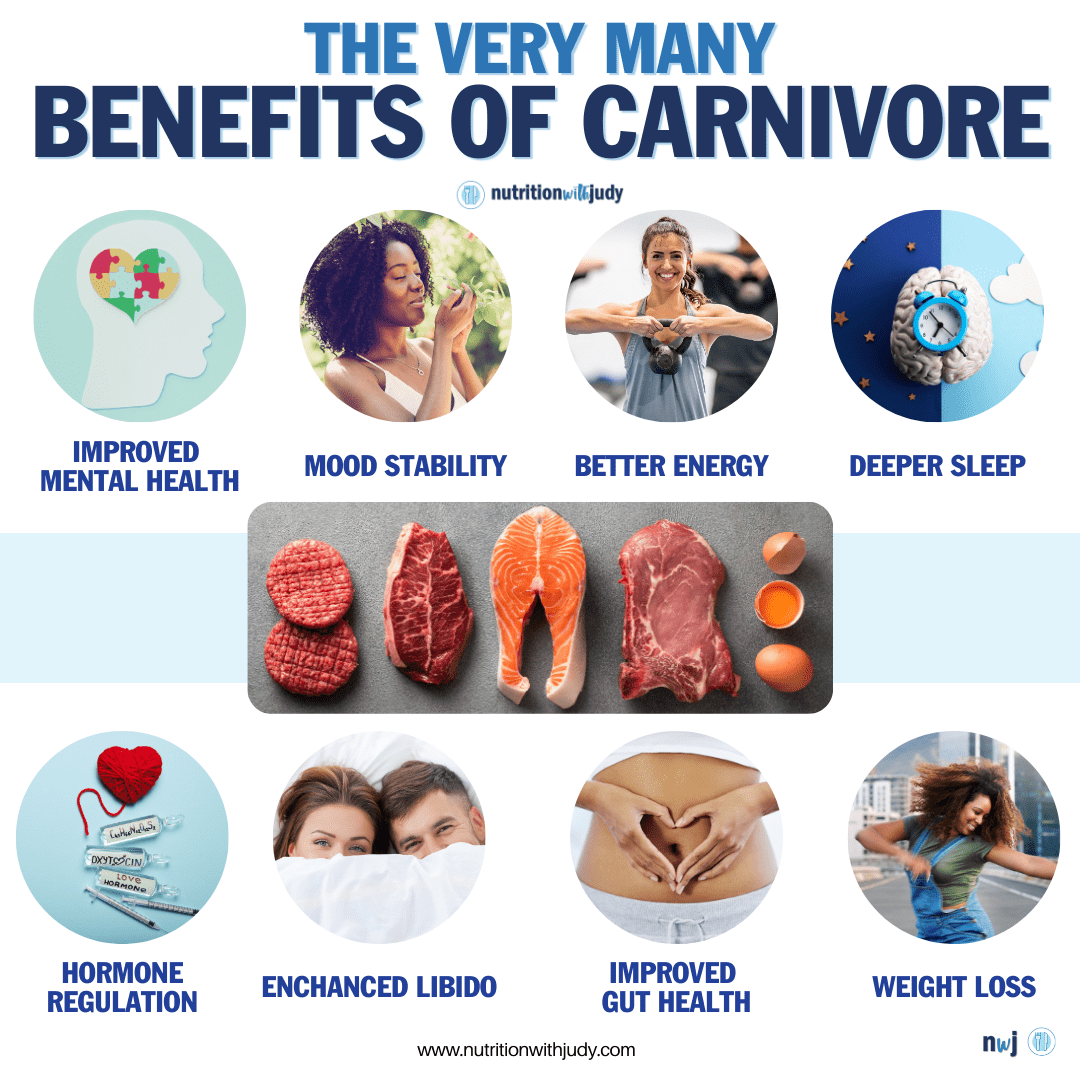

The carnivore diet exhibits numerous benefits, including gut healing, autoimmune support, weight loss, and better mental health. While this subject requires more research, current scientific data and our clinical practice showcase significant therapeutic potential with the carnivore diet and mental wellness. By delivering essential nutrients needed for mental health, supporting the gut-brain axis, and eliminating culprits that can contribute to mental health conditions, the carnivore diet offers the following benefits.
The Carnivore Diet Supports Mental Health
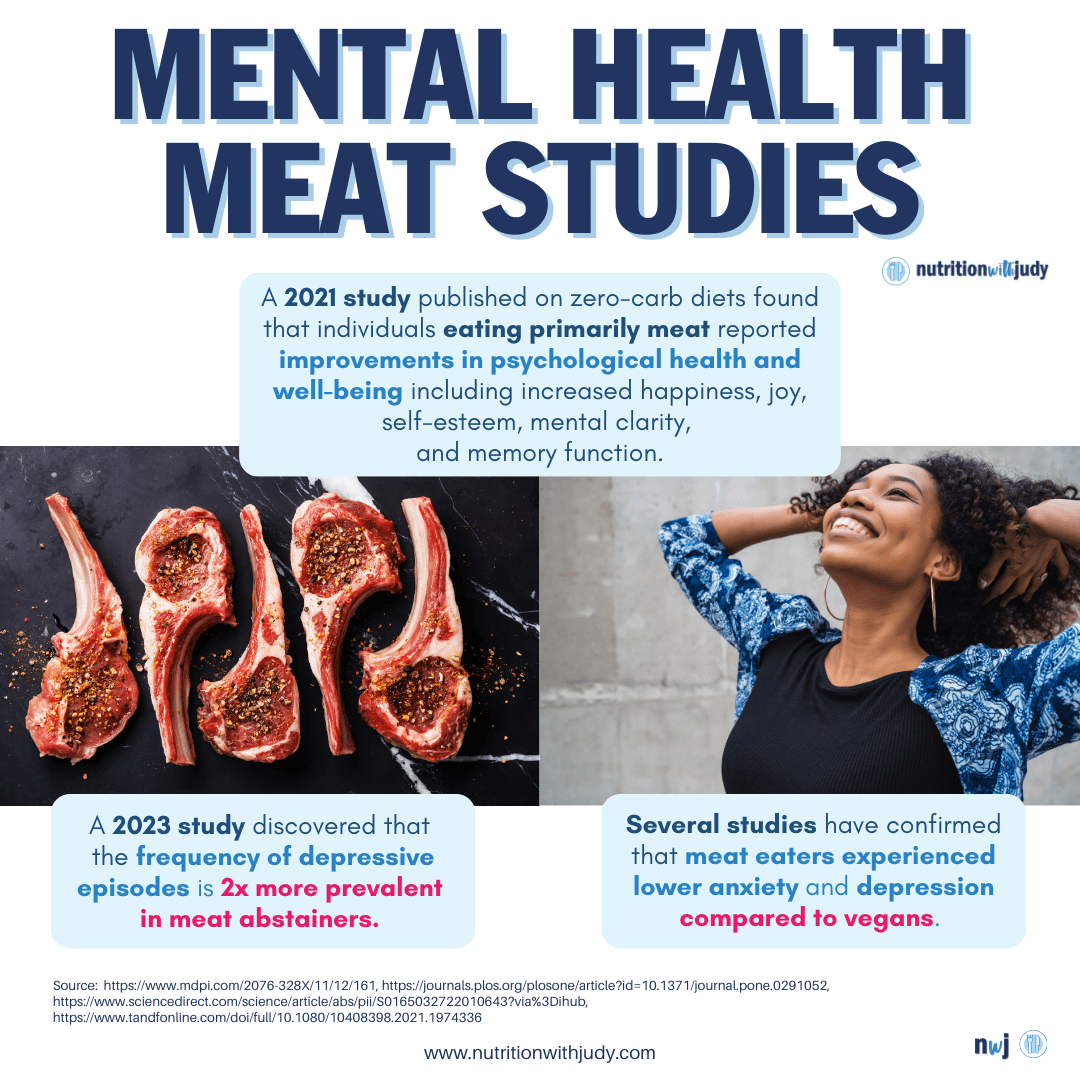

A meta-analysis from the Critical Reviews in Food Science and Nutrition found that meat intake was linked to lower rates of depression. The researchers analyzed 20 studies with a total of 171,802 subjects, of whom 157,778 were meat consumers and 13,259 were meat abstainers. In addition to lower depression rates, meat intake was associated with reduced anxiety. Researchers confirmed that compared to vegans, meat eaters experienced lower anxiety and depression, regardless of gender. Interestingly, the more rigorous the study, the clearer the link between meat intake and better mental health.
In 2021, the same journal published a systematic review on a similar subject. The main objective was to evaluate the relationship between the avoidance or consumption of meat and psychological health and well-being. The review analyzed 18 studies with a total of 160,257 subjects of whom 149,559 were meat eaters and 8584 meat abstainers.
Results showed that most studies, especially high-quality research, confirmed that avoidance of meat was linked to significantly higher rates of depression, anxiety, and self-harm behaviors. That’s why the review couldn’t support the idea of improving mental health through avoidance of meat.
The January 2023 issue of the Journal of Affective Disorders published a cross-sectional analysis whose primary objective was to investigate the relationship between a meatless diet and depression. The analysis was performed with baseline data from one Brazilian cohort that included 14,216 people aged 35 to 74 years. The scientists found a positive link between the prevalence of depressive episodes and a meatless diet. The frequency of depressive episodes was two times more prevalent in meat abstainers compared to meat eaters. The relationship between a meatless diet and depression persisted independently of lifestyle and socioeconomic factors.
A randomized controlled trial from the September 2023 issue of PLoS One found that anxiety levels were lower in subjects who increased meat consumption. The main goal of the study was to examine the effects of disclosing genetic information on levels of anxiety or depression. The study also investigated the link between these psychological factors and diet. Researchers enrolled 100 healthy adults randomized to two groups. Male subjects experienced significant changes in dietary factors and psychological health. Participants who perceived their anxiety risk low showed a notable increase in protein consumption at three months compared to baseline. They also had lower levels of anxiety.
December 2021 issue of Behavioral Sciences published a study that focused beliefs and experiences of people who followed a zero-carb diet. Participants whose diet consisted primarily of meat reported improvements in psychological health and well-being. Their mood and cognition improved with meat intake. The presence of anxiety, depression, and tiredness was reduced. People with a zero-carb diet reported increased happiness, joy, self-esteem, mental clarity, and memory function.
Improve Gut Health and Mental Well-Being
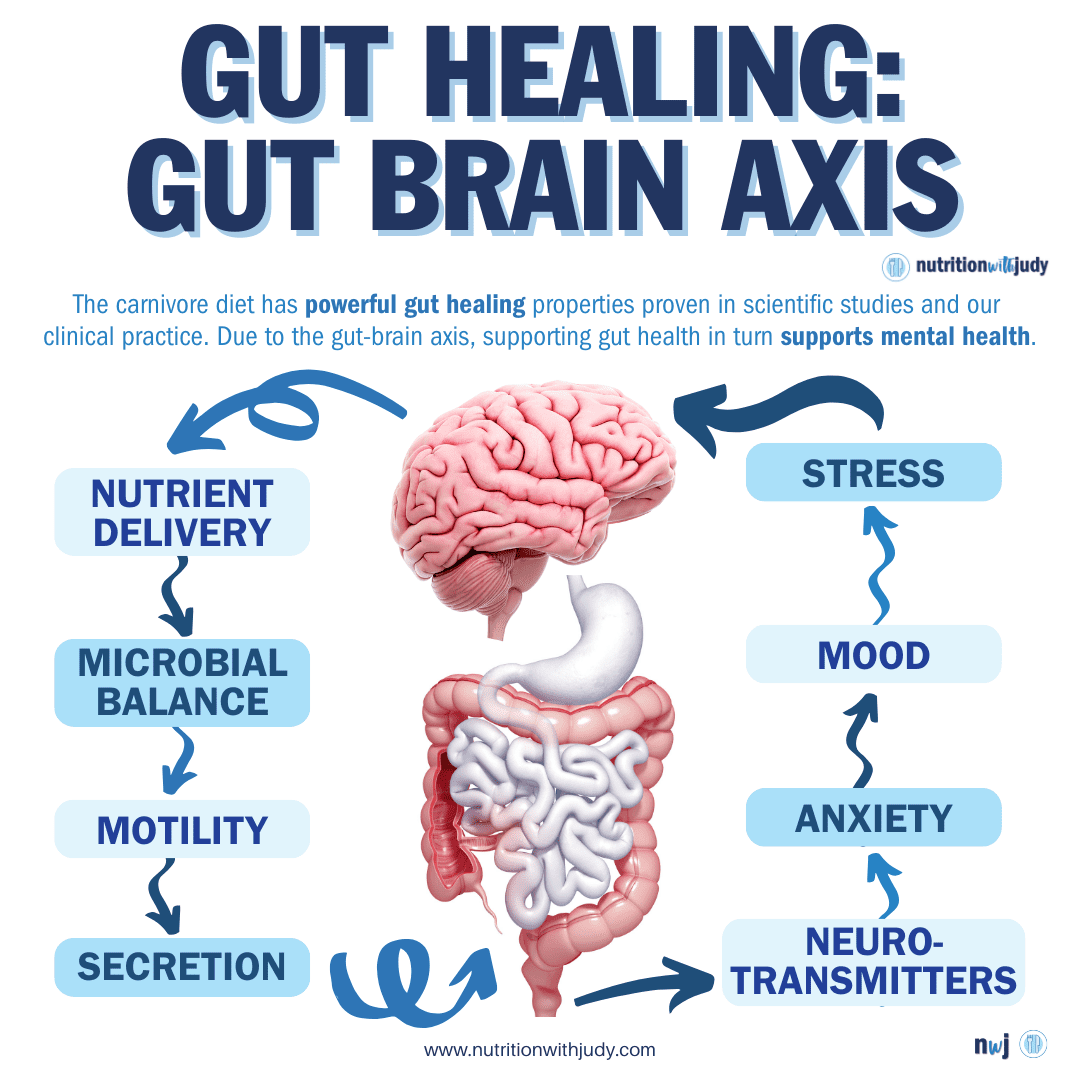

The abovementioned study from the Behavioral Sciences found that people with zero-carb diets experienced improvements in digestive health. For example, a meat-focused diet led to the reduction or elimination of symptoms of digestive problems like irritable bowel syndrome. Meat contains nutrients such as iron, which are necessary for gut health. This matters because a healthy gut is necessary for a healthy mind or improved mental health.
The gut and brain are connected through the autonomic nervous system, hypothalamic-pituitary-adrenal (HPA) axis, and the nerves in the gastrointestinal (GI) tract. That way, the brain can affect intestinal activities, and the gut can influence mood and mental health. Gut microbiota influences nutrient availability and plays a role in the release of biologically active peptides from enteroendocrine cells. As a result, gut microbiota affects the gut-brain axis. An imbalance of good and bad bacteria in the gut can contribute to inflammation, which is associated with depression and its symptoms.
Gut microbiota contributes to mental health problems such as anxiety through several mechanisms. These include stress reactivity and inflammation. Both problems can lead to symptoms of anxiety and other mental health illnesses such as depression.
The carnivore diet is associated with better gut health, which can thereby go on to support mental health and well-being.
Mood-Enhancing Nutrients From the Carnivore Diet
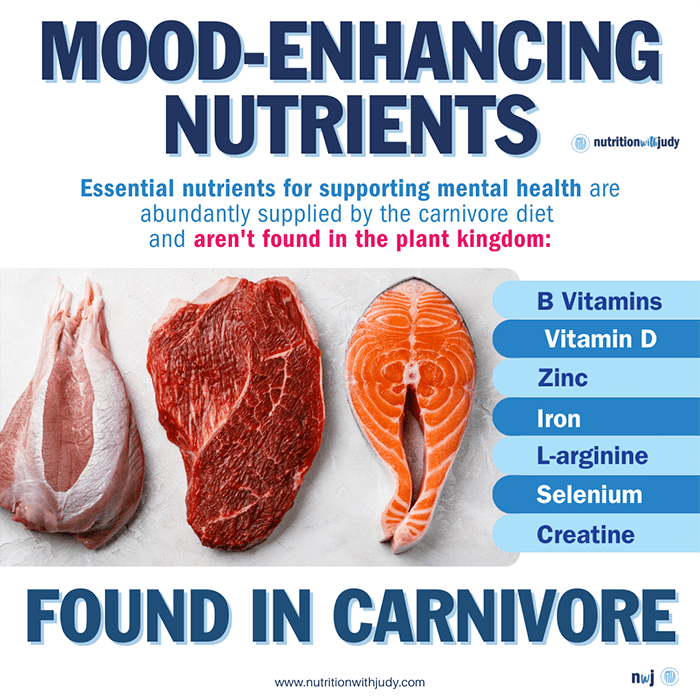

In addition to gut health, the carnivore diet supports mental health thanks to the wide spectrum of nutrients it delivers. Many nutrients from the carnivore diet support mental health. The carnivore diet is also rich in cholesterol which is significant since low cholesterol levels are associated with depression. The nutrients above are either exclusively or abundantly from animal sources with very limited bioavailability from plant sources. Plant sources also have anti-nutrients, glyphosate, and other concerns; learn more about those concerns here. Eliminating culprits such as gluten, aflatoxins, and lectins is also linked to helping support mental health. Glyphosate exposure has also been linked to increased anxiety and depression-like behavior.
The carnivore diet supplies the body with:
- Vitamins from B-complex
- Vitamin D
- Iron
- Zinc
- L-arginine
- Selenium
- Creatine
Vitamins from B-complex are a good example. Red meat is an excellent source of vitamin B12 and vitamin B6. Evidence shows that a higher intake of vitamins B12 and B6 reduced symptoms of depression. Deficiency in vitamin B12 can cause mental disturbances. In one study, supplementation with vitamin B12 delayed the beginning of depression and improved the effect of antidepressants. The carnivore diet gives a person the opportunity to experience mood-enhancing effects of nutrients. This is achieved without taking supplements for the specific vitamin or mineral.
Salmon and red meat are a great choice for vitamin D or sunshine vitamin. Vitamin D is known for its role in strengthening the immune system, but it has other benefits too. This vitamin is necessary for optimal mental health. Evidence confirms that vitamin D levels play a role in depression. The exact mechanism is unknown, but the homeostatic, immunomodulatory, and neuroprotective effects of vitamin D could be involved. A review from the December 2022 issue of Current Nutrition Reports shows low concentration of vitamin D is linked to increased symptoms of anxiety and depression. By supplying the body with vitamin D, a carnivore diet could support mental health.
Meat consumption enriches the body with iron, a mineral that is essential for blood production. Iron is necessary for optimal mental health, too. A database analysis from the May 2020 issue of BMC Psychiatry showed iron deficiency is connected to an elevated risk of anxiety disorders, depression, psychotic disorders, and sleep disorders. Healthy levels of iron could reduce the risk of mental disorders or their symptoms. The impact of iron on mental health stems from its role in the production of blood. Low iron levels mean that lower oxygen levels reach the cells thereby preventing them from working properly. Your brain needs iron to function properly. Reduced levels of this mineral affect processes in the brain including psychological well-being.
Red meat is a wonderful source of mineral zinc, which supports numerous functions including immunity, cell health, and brain functions. Zinc plays a role in mood. Reduced levels of this mineral are associated with anxiety and depression. One factor in the relationship between zinc deficiency and depression involves the mineral’s action on the brain-derived neurotrophic factor (BDNF), a growth factor that participates in neurogenesis and differentiation. Zinc interacts with BDNF, and its deficiency lowers neurogenesis, thus paving the way to symptoms of depression. Zinc isn’t just associated with depression. Low levels of zinc in the body are linked to anxiety as well.
A meat-based diet is abundant in l-arginine, an amino acid primarily necessary for circulation. This amino acid exhibits anti-stress effects, manages depression, and improves cognition. L-arginine reduces oxidative damage and increases mitochondrial functions in the brain. The body needs l-arginine to produce nitric oxide. Nitric oxide is a chemical that dilates blood vessels to improve blood circulation. It helps people feel and think better.
Weight Loss and Mental Health


People decide to start the carnivore diet for many reasons. One of those reasons is to lose weight. In one study, most participants who were overweight at the beginning reported improvements with the carnivore diet. The diet helped them lose weight and maintain healthy weight loss. One way through which a carnivore diet supports mental health is weight loss or its maintenance in a healthy range. Being overweight or obese increases the risk of mental health disorders including anxiety and depression. Multiple weight loss attempts are also associated with depressive symptoms. This could be due to unrealistic goals and expectations.
The reasons behind poor mental health in overweight or obese individuals may differ from one person to another. It’s usually due to low self-esteem and confidence, high levels of dissatisfaction, and loss of motivation. By helping people manage their weight and keep it in a healthy range, the carnivore diet also supports mental health.
Closing Thoughts On the Carnivore Diet for Mental Health
Making the appropriate dietary changes is essential for supporting mental health. The carnivore diet offers so many benefits for helping optimize mental wellness and alleviate mental health conditions. While the carnivore diet may offer root-cause healing for some, others may need to look deeper for additional culprits. If you’re still struggling with your mental health after six months of being on the carnivore diet, you may want to consider environmental illnesses such as Chronic Inflammatory Response Syndrome (CIRS) and other toxins including heavy metals and gut infections.
Work With Our Trusted Carnivore Diet Functional Nutritional Therapy Practitioners
The Nutrition with Judy practice is honored to be a trusted carnivore diet practitioner support serving clients from around the globe. We’re passionate about helping our clients achieve root-cause healing in order to lead the best quality of life possible that’s nearly symptom-free. Our team is dedicated to educating our community about the incredible benefits of the carnivore diet. We welcome you to explore our free resources and are always available to support you through personalized protocols. Our Symptom Burden Assessment (SBA) is the perfect starting point for discovering your root cause and is required to work with our team— you can learn more in-depth about this powerful tool here.
Start your root-cause healing journey today and contact us any time with any questions or concerns.
DISCLAIMER: This content is for educational purposes only. While we are board-certified in holistic nutrition and are nutritional therapy practitioners, we are not providing medical advice. Whenever you start a new diet or protocol, always consult with your trusted practitioner first.




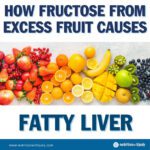

Tom Rudy
November 6, 2023 at 2:25 pmI’ve straddled with deep depression and anxiety for most of my life. I’m 76 now. I’m interested in trying the carnivore
Diet. I’ve been on meds for about 35 years and it has given little to no and only temporary relief.
Thank you,
Tom Rudy
Tom Rudy
November 6, 2023 at 2:29 pmCan you recommend a Carnivore diet
Thank you,
Tom Rudy
Jeff
November 13, 2023 at 9:48 amGive it a try! Many people try 30 days are are so healed that they don’t want to stop.